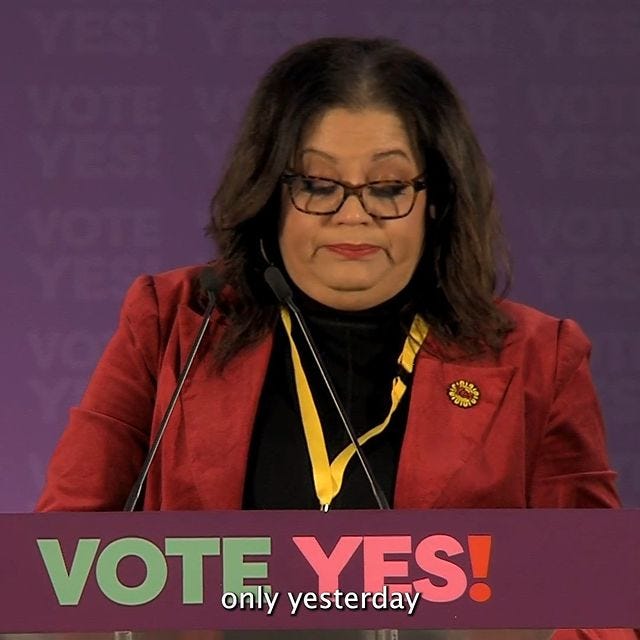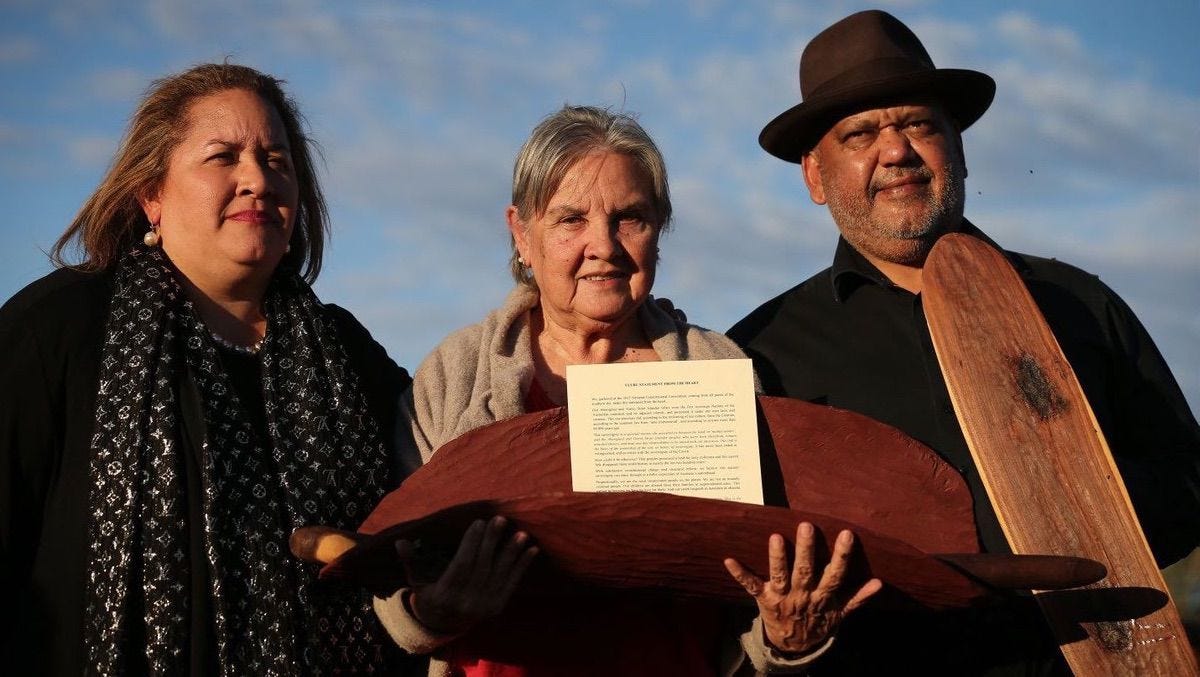If a tree falls and no one hears it, does it make a noise? If someone speaks - even screams - and no one listens, does it make a sound? Having a voice is one thing: having a voice that is heard is something altogether different.
The title of this substack makes it pretty clear that right now I’m on sabbatical and I’m not going to lie. I am being fanatical about this being an actual sabbatical. I’m writing for fun when the urge hits but I’m not working. Actively “not working” is a skill I’m working on.
A big chunk of my day job is spent focused on the art of persuasion and while I’m here I’m resting that skillset. (Irritatingly, seeking to persuade my three youngest roommates to undertake various activities they’d prefer to resist - whether it be homework, brushing teeth, placing their towels on hooks, clothes in the laundry basket et al - remains ongoing.)
Parenting and domesticity aside, I’m a persuasion-free zone. But there is one exception and it’s big. History-making, nation-changing B-I-G. In just over a fortnight, every Australian aged over 18 will be asked a question and the way in which we respond will shape this country for generations.
Will a majority of Australians, in a majority of States, vote YES to enshrining a Voice to Parliament in our constitution?
The power of this question, this moment, cannot be underestimated. Constitutional change may sound complex and dry, but there is nothing dry about this referendum. It is a matter of the heart. While it’s easy to believe, or construe, this as an incredibly complex matter, it’s not. It’s simple.
Are we, as a nation, willing to walk together? To unite around a desire to do better?
Ahead of the referendum being held in Australia on the 14th of October, I will be making my way to the Australian Consulate-General here in Toronto to cast my YES vote and I’d strongly and sincerely encourage you to do the same. (Not necessarily here in Canada but writing YES on the ballot from wherever you are.)
Why am I voting yes?
I am voting yes because a Voice to Parliament is what First Nations people have asked for.
I am voting yes because not having a voice, or not having the tiniest hope of your voice being heard, is the definition of powerlessness. For too long First Nations people in Australia haven’t been heard. Not because they haven’t spoken but because they haven’t been listened to.
I am voting yes because one of the staunchest, most incredible women I know, Tanya Hosch, stood up the day after getting out of hospital to have her leg removed, and delivered this speech.
I will vote yes because I don’t want to live in a country that accepts the structural and systemic disempowerment of First Nations people for a day longer. Without a voice? Structural and systemic disempowerment will prevail.
Because the gap between the health, social, economic & educational outcomes between Aboriginal and Torres Strait Islander people and non-Indigenous Australians is shameful.
Because Aboriginal and Torres Strait Islanders remain the most incarcerated people on the planet. On. The. Planet.
Because Aboriginal children are still ELEVEN times more likely to be in out-of-home-care than non-Aboriginal children. In the year 2023.
Because it's been more than 250 years since Captain Cook arrived on our shores and declared Australia uninhabited. Because it's been more than 100 years since the Australian Constitution was created, and still, Aboriginal and Torres Strait Islander people aren’t acknowledged.
None of this is acceptable or inevitable, and none of it will change if nothing changes. Yes, is a vote for change. It is a vote for respect and dignity and civility and heart and unity. A future in which the voices of First Nations people are heard. No, is a vote for the status quo. A future in which the voices of First Nations people remain unheard.
I am voting yes to changing Australia’s constitution to enshrine an Indigenous Voice to Parliament because yes means accepting the gracious invitation extended by First Nations people to all Australians to walk together to build a better future in the Uluru Statement from the Heart.
The Uluru Statement is the most profound and generous capsule of 418 words you will ever read. If you read nothing else ahead of 14th October referendum make it these words:
We, gathered at the 2017 National Constitutional Convention, coming from all points of the southern sky, make this statement from the heart:
Our Aboriginal and Torres Strait Islander tribes were the first sovereign Nations of the Australian continent and its adjacent islands, and possessed it under our own laws and customs. This our ancestors did, according to the reckoning of our culture, from the Creation, according to the common law from ‘time immemorial’, and according to science more than 60,000 years ago.
This sovereignty is spiritual notion: the ancestral tie between the land, or ‘mother nature’, and the Aboriginal and Torres Strait Islander peoples who were born therefrom, remain attached thereto, and must one day return thither to be united with our ancestors. This link is the basis of the ownership of the soil, or better, of sovereignty. It has never been ceded or extinguished, and co-exists with the sovereignty of the Crown.
How could it be otherwise? That peoples possessed a land for sixty millennia and this sacred link disappears from world history in merely the last two hundred years?
With substantive constitutional change and structural reform, we believe this ancient sovereignty can shine through as a fuller expression of Australia’s nationhood.
Proportionally, we are the most incarcerated people on the planet. We are not an innately criminal people. Our children are aliened from their families at unprecedented rates. This cannot be because we have no love for them. And our youth languish in detention in obscene numbers. They should be our hope for the future.
These dimensions of our crisis tell plainly the structural nature of our problem. This is the torment of our powerlessness.
We seek constitutional reforms to empower our people and take a rightful place in our own country. When we have power over our destiny our children will flourish. They will walk in two worlds and their culture will be a gift to their country.
We call for the establishment of a First Nations Voice enshrined in the Constitution.
Makarrata is the culmination of our agenda: the coming together after a struggle. It captures our aspirations for a fair and truthful relationship with the people of Australia and a better future for our children based on justice and self-determination.
We seek a Makarrata Commission to supervise a process of agreement-making between governments and First Nations and truth-telling about our history.
In 1967 we were counted, in 2017 we seek to be heard. We leave base camp and start our trek across this vast country. We invite you to walk with us in a movement of the Australian people for a better future.
This statement was the result of unprecedented, comprehensive, grassroots, community consultation led by First Nations Australians presented by 250 Indigenous leaders in 2017.
It was spearheaded by the formidable Professor Megan Davies and Pat Anderson, and supported by phenomenal First Nations leaders across generations. It took YEARS. It was not an exercise of “elites”: it was conversation after conversation after conversation led by First Nations people, among First Nations people, in communities all over the country. “Consultation” is a fancy word for enabling conversations. Hundreds and hundreds and hundreds of conversations in groups big and small, over many years, in community after community, fed into the Uluru Statement.
To contemplate the love and tears and hard work that went into crafting that statement is astonishing.
It has been shown, consistently, that around 80% of First Nations Australians support the Uluru Statement and the voice is at its heart. Getting 80% of any population group to agree on something is huge. Having consensus among 80% of First Nations people is seismic.
There are First Nations Australians who don’t support the voice. Of course there are. Some of them are loud and at a glance it might be easy to assume they are sizeable. They are, however, in the minority.
A Voice to Parliament will enable Indigenous people affected by decisions made about them to advise politicians about what really works in their communities. It’s not a third chamber. Any advice would not be binding.
But the voice would create a systemic mechanism for First Nations people to be heard. Being enshrined in the constitution means this cannot easily be unwound by a new government and this is critical. Legislation can be unwound relatively easy. Changing the constitution is far harder. A voice to parliament will create a formal relationship between First Nations people and the government.
What works for lots of communities is known, but it hasn't been enacted. Why? Not because communities haven’t said what they need or what would work. Because those voices have been ignored. The Voice to Parliament will provide a systemic and structural mechanism to ensure the voices of First Nations people are heard, to ensure that the communities’ needs are considered.
To say it's time to change this is an understatement. We have the opportunity to make this change. We cannot let this moment pass. May you bring your heart to the ballot box on the 14th of October.
If you are still undecided, I cannot recommend this explainer from Shelley Reys AO more highly.
I also cannot recommend Lauren Dubois more highly. Click on the link to “The Voice” content.
Between now and the 14th of October every conversation with every person about the voice matters. Misinformation and fear mongering abounds and there are fair-minded, good-hearted voters who genuinely believe the voice is divisive and dangerous. There is still time to ensure as many voters as possible are properly informed and understand the opportunity and hope this referendum presents.
Both Yes23 and Uluru Statement have incredible resources and information about the voice. Seek it out, share it widely and don’t be afraid of having conversations with people you know and love and disagree with. Every uncomfortable conversation between now and the 14th will be worth it to arrive at Yes.








